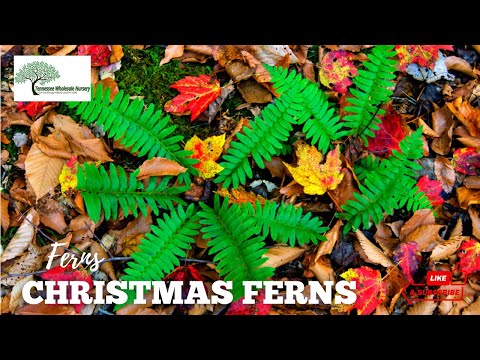Christmas Ferns are Hardy Evergreen Natives for Lasting Beauty
If you want Christmas ferns that are hardy, long-lasting, and grown by people who know native plants, this is the fern gardeners' trust year after year. TN Nursery specializes in native plants that thrive in most climate zones.
This fern is one of the most reliable evergreen ferns in North America, valued for its deep green fronds that stay through winter and bounce back quickly in spring. We grow our plants for strong roots, so they establish well and thrive in real landscapes, not just in greenhouses.
Why Our Christmas Ferns Are Different
We do not resell mass-produced plants. Our ferns are native, grown to have strong roots, adapting well and surviving in real-world conditions. This makes a difference. Ferns with healthy roots establish faster, handle dry spells better, and grow fuller over time. We apply the same high-quality standards as those used in large landscape and restoration projects, where plants must thrive.
Gardeners choose this fern because it provides structure throughout the year and requires minimal upkeep. Its tough fronds keep their shape through cold, snow, and wind, so it still looks good in winter.
Ideal Uses for Christmas Ferns
Christmas Ferns do well in shade or part shade, so they are great for woodland gardens, borders, under trees, along foundations, and on gentle slopes where you want to keep soil in place. Their roots help hold soil, making them a good pick for spots that might erode and get filtered light. They also look nice with other native shade plants and give a calm, natural look that is never too busy.
Planting & Long-Term Care
Plant in well-drained soil and keep them watered during their first season. Once they are settled, they are tough and easy to care for. Adding leaf litter or natural mulch helps them grow, just like in their native forests. Unlike many other ferns, these do not require frequent division or special care to remain healthy.
Botanical Information
Botanical Name: Polystichum acrostichoides
Type: Evergreen native fern
Growth Habit: Clumping, upright fronds
Use: Shade gardens, woodland landscapes, erosion control
Buy Christmas Ferns with Confidence
When you buy fern plants from a grower with years of experience, you are getting plants chosen for how well they perform, not for shortcuts. Homeowners, landscapers, and professionals pick these ferns because they want reliable results every season. If you want a native evergreen fern that offers beauty, structure, and longevity, it is a great choice for a shade garden.
We ship bareroot Christmas Fern rhizomes, and below is a sample of what you will receive. Plant it, and the following Spring, it will produce fronds (tops) and become large and beautiful.

Customer Reviews
I bought 50 Christmas ferns about 7-8 yrs ago from TN nursery for my 50 acre woodland. They have done great even in the drier shady areas just shorter than in the damp areas.
The Christmas Ferns I bought from TN Nursery are exceptional quality. They brighten up the shaded areas of my property and provide lasting greenery even through the winter. I appreciate the care TN Nursery puts into shipping healthy plants. These ferns are a wonderful investment.
I am thrilled with my Christmas Fern purchase. These ferns add elegance and texture to my shaded garden, and they’ve remained healthy and strong since planting. TN Nursery shipped them promptly, and the packaging ensured every fern arrived intact. Highly recommended!
The Christmas Ferns I purchased from TN Nursery are outstanding. They arrived healthy, with rich green fronds, and have already spread nicely in my woodland area. I love that they stay green all year long and add natural texture to my landscape. TN Nursery is the best source for ferns.
I am beyond satisfied with the Christmas Ferns from TN Nursery. They are hardy, adaptable, and look beautiful in my shaded front yard. I was impressed by how well the plants were shipped and how quickly they settled in. A must-have for anyone who wants reliable evergreen ferns.
Do Christmas ferns like sun or shade?
Christmas ferns prefer partial to full shade for best growth.Their evergreen fronds stay lush year-round, making them an easy and attractive choice for shaded gardens.
Do Christmas ferns spread?
Yes, Christmas ferns spread slowly over time through short underground rhizomes. They form neat clumps that gradually expand, creating beautiful green patches in shaded areas. Their controlled growth makes them perfect for low-maintenance ground cover.
Do Christmas ferns come back every year?
Yes, Christmas ferns come back every year and stay green even through winter. Their hardy evergreen fronds provide lasting color in shaded gardens. They’re reliable, low-maintenance plants that thrive year after year.
Exposure
Shade
Height at Maturity
Over 2 Feet
Usage
Shade Plant
Shipped As
Bare-root
Ships
USPS
Planting Zones
3-9
How To Grow
How to Grow and Care for Bare Root Fern Rhizomes
Bare root fern rhizomes are easy to plant and bring lush, woodland beauty to shaded or partially shaded areas. To begin, soak the rhizomes in water for 1–2 hours before planting to help rehydrate them. Choose a planting site with rich, well-draining soil high in organic matter. Ferns thrive in moisture-retentive soil, so amending with compost or leaf mold is ideal.
Dig a shallow hole wide enough to spread the rhizome out horizontally, and place it just below the soil surface with the growing tips (or “eyes”) facing upward. Cover lightly with soil, press gently, and water thoroughly. Keep the soil evenly moist—never dry or soggy—while the fern establishes.
Mulch with leaf litter or pine needles to conserve moisture and mimic the fern’s natural habitat. Avoid direct sunlight, as most native ferns prefer cool, shaded conditions. With patience and proper care, the rhizomes will send up new fronds and form a graceful, low-maintenance colony that returns year after year.







